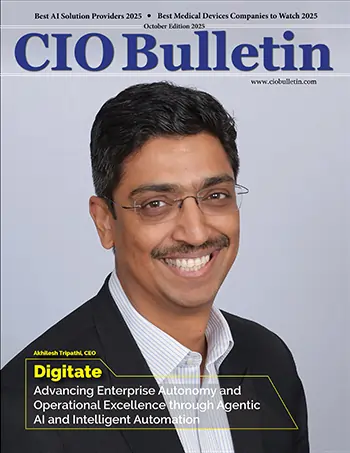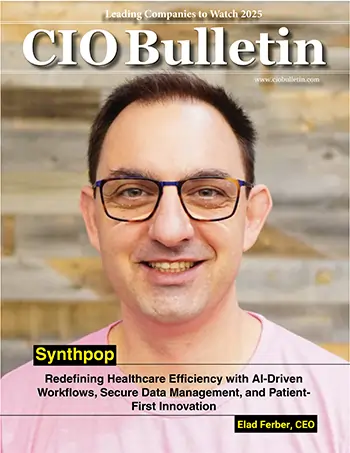Business Excellence Awards 2024
CIO Bulletin

Artificial intelligence (AI) is transforming how industries approach technology, but many companies still struggle to fully integrate AI into their operations. Recent legal issues have added complexity, highlighting the crucial need for clear rules and trustworthy systems as AI expands. This is especially critical in healthcare, where deploying AI effectively and ethically isn't just a goal—it's essential.
Exponential AI has become a leader in advancing AI adoption in healthcare by making significant investments over the past five years. Their focus is on seamlessly integrating AI into everyday healthcare operations. This means using AI to streamline tasks like patient care management, administrative duties, and medical decision-making processes. Their solutions are designed to achieve two key goals: reducing costs and improving outcomes. By leveraging AI, Exponential AI helps healthcare providers save money on both medical procedures and administrative tasks. This efficiency not only cuts down on expenses but also enhances the overall quality of care delivered to patients.
Nikhil Mendhi, President and COO of Exponential AI, spoke exclusively to CIO Bulletin about how his company is leading the healthcare revolution with integrated AI solutions and strategic vision.
Interview Highlights
Q. Thanks for being here today. Today, Exponential AI is synonymous with Healthcare AI. What led you to focus on healthcare AI?
Exponential AI is a result of the founding team’s collective experience of digital transformation and innovation across healthcare.
Healthcare has traditionally been slow to adopt new technology compared to other industries. Slower adoption rates are primarily due to rule-based approaches, antiquated information infrastructure, fast-changing regulation, and market fragmentation.
For AI to really work in healthcare, it’s got to handle both structured and unstructured data and work effortlessly across diverse environments (on-premises and in the cloud), all while staying secure within client firewalls and delivering real-time results. This is what inspired Exponential AI’s Healthcare AI Journey.
Q. That’s fascinating. So, how is Healthcare AI different from AI in other industries?
As you know, healthcare is local — delivered and consumed differently across various populations and geographies. This inherent nature of healthcare challenges the traditional one-solution-fits-all approach.
At Exponential AI, we’ve designed an offering that acknowledges and addresses this unique challenge of healthcare. Domain-specific AI solutions built using our platform can learn and respond to any market-specific behaviors and trends. By combining the probabilistic nature of AI with deterministic rules, we are able to deliver decisions unique to each context.
But what really differentiates us is our capability to deliver these decisions in real-time. We don’t just analyze data and provide recommendations; we convert insights into real-time actions. This maximizes the impact of AI, whether it’s scrutinizing healthcare claims, identifying fraud, optimizing care, or triggering proactive interventions.
Q. What roadblocks did you hit when rolling out AI in healthcare, and how did you tackle them?
Making AI work in healthcare can be a challenge. You encounter not only technical challenges such as data silos, fragmented systems, and unstructured data but also issues in how people understand AI — their limited use of AI as analytics, treating AI like software, and ultimately, dealing with change management.
We strongly believe that unstructured data, combined with algorithms and rules, will lead to better, more consistent, and faster decisions at scale.
ENSO, our platform, has been instrumental in helping us deliver this approach to enterprises. It is a healthcare decision intelligence platform for building, training, orchestrating, and managing AI solutions. It offers a suite of pre-built, pre-trained agents that can be assembled and orchestrated into solutions. These agents adapt to client-specific data, are reusable across various processes, and continually evolve with each decision and piece of data.
Q. But the expansion of AI in healthcare is bringing its fair share of challenges. This is particularly evident in the face of concerns and legal challenges around biases. How does Exponential AI address and mitigate these biases in its AI solutions?
We’ve developed a robust model-management platform that helps our clients manage both intended and unintended biases. This is especially crucial given the biases that can creep in through client-specific data and the constantly changing regulatory and market environments.
Our platform is engineered to send proactive alerts about patterns indicating potential biases. Looking ahead, we see a big future for platforms that enable the transparency, governance, and security of AI applications.
Q. While we’re talking AI, what’s your take on the rise and role of Generative AI in healthcare?
Absolutely! Generative AI is creating quite a stir, rightfully finding its place on every CEO’s agenda. As you know, every new technology goes through a journey. It kicks off with the excitement of innovation, hits a peak of expectations, followed by the trough of disillusionment, a steady climb up the slope of enlightenment, and finally leveling off at the plateau of productivity. We’re currently seeing Gen AI at the Peak of Inflated Expectations stage.
Gen AI holds the promise to revolutionize healthcare processes, fundamentally transforming how care is delivered and administered.
Today, Gen AI adoption is still in its early stages. Processes, including prior authorization, provider contract management, benefits management, and member and provider communication, stand to gain substantially from its capabilities. For healthcare organizations, the priority should be on establishing the necessary infrastructure to build, train, integrate, deploy, and maintain Gen AI solutions.
The large language models that are currently available are too generic for healthcare and will require significant training and calibration to be ready for healthcare applications. At Exponential AI, we focus on domain-specific Large Language Models (LLMs) and integrating them with existing workflows and applications.
The future of Gen AI in healthcare is promising, and we’re actively engaged in shaping its potential impact and facilitating its adoption within the sector.

Q. What advice do you have for top executives on integrating AI into their business models?
For enterprise leaders, instead of viewing artificial intelligence (AI) as a tool, we encourage them to think of it as a differentiator. Instead of buying one AI solution at a time, they need to envision and plan a comprehensive, enterprise-wide AI journey. This means taking a hard look at the organization’s approach to data and the development and governance of AI solutions.
The first step is recognizing that the organization’s operating model must evolve to effectively scale and accelerate AI adoption. This evolution involves a strategic shift from merely moving data to AI systems to operating these AI workloads across various environments. It’s about creating an ecosystem where AI and existing systems coexist, allowing AI to enhance and complement existing processes and systems rather than replace them. This synergy, I think, is key to achieving the desired business outcomes.
The Visionary Leader at the Helm of Exponential AI
Nikhil Mendhi serves as the President and Chief Operating Officer of Exponential AI. He is a seasoned healthcare technology executive with over 20 years of experience leading high-growth ventures. Nikhil has successfully led large-scale transformations and enterprise-wide initiatives for Fortune 500 conglomerates in the US, South America, the Middle East, and Asia. He has extensive experience in transforming operations, product development, platform delivery, strategic planning, and change management.







